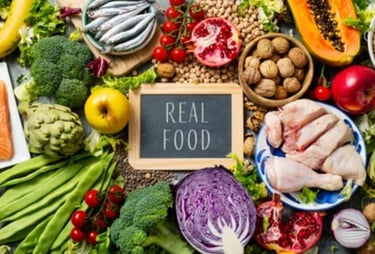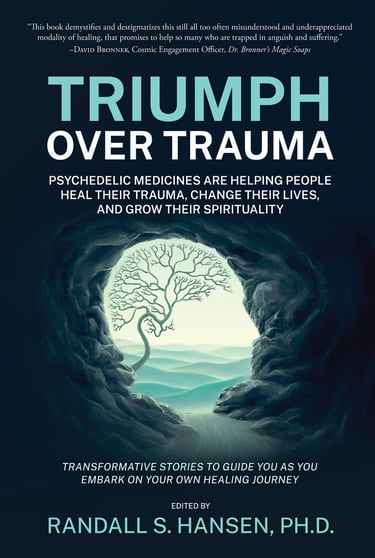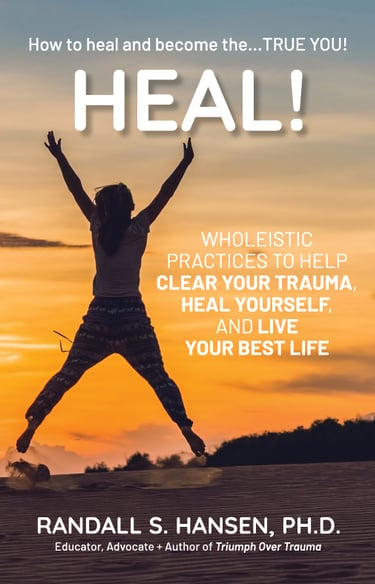Healing Starts With Eating Real Food: No More Fast Food
Are you overweight? Often fatigued? Doctor nagging you to change what you eat? Spend too much time consuming fast food?
The vast majority of fast food should be outlawed -- or would be if I ruled the planet. The food is stripped of most nutrition, rarely fresh, often pre-packaged in bulk quantities at a production plant before being shipped to the restaurant. Thus, most of your fast food was prepared from frozen, canned, or dehydrated materials and reheated -- or worse, stuck under a heat lamp.
The "food" itself is mostly fats and simple carbohydrates, seasoned with salt and sugar... resulting in high calories and carbs and low nutrition, which will leave you wanting more about 30 minutes after finishing your meal... and the cravings will start anew. Don't forget what this stuff does to your blood sugar levels and spiking/tanking.
In fact, fast food should be rebranded as fast-way-to-die-food.
What's the Harm in Fast Food?
Fast food -- yes, the so-called food at McDonald's, Wendy's, Pizza Hut, Subway, Burger King, Arby's, Papa John's, KFC, Chick-fil-A, In-N-Out Burger, Domino's, Taco Bell -- should be considered slightly better than biowaste. Please stop eating these high-calorie, nutrient-deficient "foods."
These establishments use the lowest quality ingredients (because of profits) -- which means more toxic chemicals, more antibiotics, more hormones, more pesticides -- as well as the worst additives in sugars, salts, and inflammatory oils. The food quality is some of the lowest in the land.
In fact, even the main ingredients (such as factory eggs, meat, cheese) are diluted with chemicals fillers and preservatives. In one study, a fast-food hamburger had a meat content is only 2.1 to 14.8 percent. Please do not even mention the completely chemical "meatless" burgers, which are the scariest. (Read more here.)
What's the harm in fast foods? Consider these ingredients:
Sugar (one of the most harmful/toxic and addictive compounds in the world) -- it's in everything, from sauces and dressings to batter and bread.
Fats (and not the healthy kinds) -- multiple types of harmful fats and oils are in all fast foods, from trans fats to toxic oils to unhealthy fat from factory meats.
Sodium -- often used as both a seasoning and a preservative, be prepared for a sodium spike: one fast food meal can include as much as 1,300 milligrams of sodium -- more than half of the daily recommended intake -- which can result in high blood pressure and cardiac issues.
Harmful Chemicals -- in many forms, though especially in the meatless choices. Some of the chemicals in fast foods include propylene glycol (stabilizer), sodium nitrate (preservative), synthetic food dyes (coloring), ammonium sulfate, fillers (such as cellulose, potassium bromate), and traces of pesticides (from non-organic produce).
Please start carefully reading and analyzing labels.
A 15-year study of more than 3,000 people found that eating fast food is linked to weight gain and insulin resistance. (Read more here.)
What's the Good in Real Foods?
Real foods are either raw foods or serve as raw materials for a more elaborate meal made from scratch. In most cases, you should consider buying organic or as close to organic as possible; some local farmers and ranchers follow organic procedures but don't bother with the label.
Real food is eaten in its most natural state and can contain these benefits:
unprocessed
free of harmful chemical additives
rich in nutrients
low in refined sugars
contains beneficial fats/oils
higher in fiber
may contain antioxidants
In addition, eating fresh (or fresh-frozen), real food is healthier for your body, brain, heart, skin. Buying real food, especially from your local farmers and ranchers, builds community.
The closer you can eat food in its natural state, the better. Studies show the positive benefits from eating diets based on whole, real foods -- in reducing risks for heart disease, diabetes, and metabolic syndrome.
When you do buy prepared foods, many experts (including Michael Pollan in his book Food Rules) suggest the Five-Ingredient-Rule, which states you should avoid buying any packaged foods with more than five ingredients -- and especially do not buy if you cannot pronounce the ingredients. (The idea is that the more ingredients and additives, the greater potential for harm and low nutritional values.)
Note about oils: Please ONLY use coconut, olive, or avocado oils in your cooking and baking. (Butter from grassfed cows also fine.) It's been shown that many seed oils are extremely harmful, causing inflammation, including: canola, corn, vegetable, sunflower, safflower, soy, cottonseed, grapeseed. (Most of these are also GMO.)
Best Real Foods That You Should be Consuming
Unless you have an allergy to one of these foods, consider incorporating these foods and enhancing your diet -- starting in their raw (unaltered) form before adding to recipes.
Super Foods:
Farm-fresh eggs. Second-best, organic. (Rest of labeling is complete BS.)
Sustainably wild-caught salmon, trout.
Leafy, green vegetables, farm-fresh or organic (to avoid harmful pesticides and herbicides).
Berries, including blueberries, strawberries, raspberries, farm-fresh or organic (to avoid chemicals).
Nuts and seeds. Add to meals and snacks. We love macadamias, almonds, pecans, walnuts, sunflower seeds, and hemp seeds.
Farm-raised meats and poultry. No factory/supermarket meats, which often contain hormones, antibiotics, and other issues. Farm-raised meats are fresher, healthier, better tasting.
Cruciferous vegetables. We especially love broccoli and kale, but also cauliflower and Brussels sprouts. Farm-fresh or organic.
Sweet potatoes and other healthy, complex carbs. Farm-fresh or organic.
Healthy Fats. Butter or Ghee from grassfed dairy cows. Avocado, olive, or coconut oils.
Final Thoughts About Healing With Real Foods
The food we eat has a major impact on our physical and mental health. We know certain foods are bad and unhealthy for us. We know food can be a trigger for us -- or it can be a comfort food when we are triggered. We know sugar is addictive and that many of us are addicted.
While it is very important to clean up your pantry and focus on what you're eating, it's also important for healing to:
Attempt moderate exercise daily
Lower stress levels/stressful situations
Maintain proper hydration (and water is best, simplest, healthiest)
Schedule periods of rest
Establish and keep regular sleep patterns/duration
Clear old traumas, hurts (via talk therapy, psychedelics, meditation, spirituality, breathwork, etc.)
Find your true people and build positive relationships/community
Finally, it goes without saying that healing comes in many modalities -- and the more of these you can start incorporating into your life, the better, faster, and healthier your healing.
Additional Resources About Healing Foods


Dr. Randall Hansen is an advocate, educator, mentor, ethicist, and thought-leader... helping the world heal from past trauma. He is founder and CEO of EmpoweringSites.com, a network of empowering and transformative Websites, including EmpoweringAdvice.com.
He is the author of the groundbreaking Triumph Over Trauma: Psychedelic Medicines are Helping People Heal Their Trauma, Change Their Lives, and Grow Their Spirituality and the well-received HEAL! Wholeistic Practices to Help Clear Your Trauma, Heal Yourself, and Live Your Best Life.
Dr. Hansen's focus and advocacy center around true healing ... healing that results in being able to live an authentic life filled with peace, joy, love. Learn more by visiting his personal Website, RandallSHansen.com. You can also check out Dr. Randall Hansen on LinkedIn.






